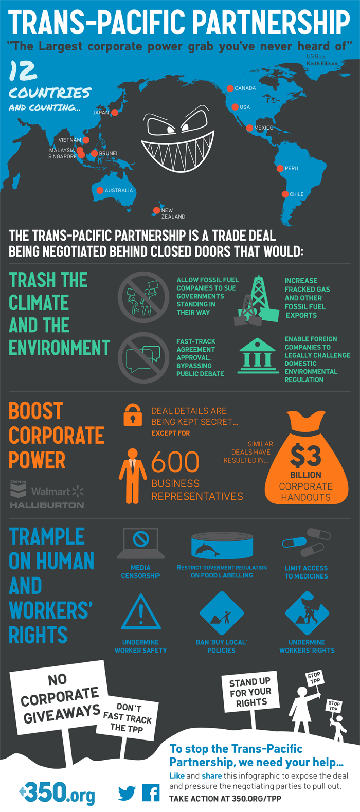Global trade news
Intimidating governments
Increasingly, trade agreements – shrouded in secrecy – are being used as a way to undermine national policy-making processes. Leaks and exposés show that U.S. negotiators are pushing American corporate interests. On the cards are new intellectual property rights, limits on financial regulation and new investor rights that could require governments to pay compensation for policies that undermine expected profits. If these agreements go through, companies could have the right to sue Governments for economic harm if health or environmental regulations interfere with profits. Scary stuff.
However there are signs that the things may be changing. In January, in response to public concern, the EU Trade Commissioner, announced a public consultation on a future EU-US trade deal, known as the Transatlantic Trade and Investment Partnership (TTIP). And according to a report in Public Citizen about the Trans-Pacific Partnership (TPP) US trade negotiators are becoming remarkably isolated:
A leaked chart detailing countries' positions last month on the most contentious issues shows that the United States stands alone among TPP countries on 1 out of every 4 controversial issues. In each of these contentious areas, all other TPP countries that have taken a position have rejected U.S. demands. If adding issues in which the U.S. position is shared by just one or two of the 11 other negotiating partners, more than 40% of the unresolved issues constitute unpopular demands made by the United States, often at the behest of corporate interests. Such divisions cast doubt on the Obama administration’s ability to meet its stated goal of concluding TPP negotiations this year....

The Kogan Law Group is a New York City–based firm specializing in 'identifying and addressing emerging regulatory, policy, and trade risks posed to multinational company assets, operations, and supply chains.' Kogan, and the 'non profit' Institute for Trade, Standards and Sustainable Development (ITSSD - http://goo.gl/0qTBpa) cleverly use selected parts of trade agreements without recognising that governments have sovereign rights and duties to protect health.
Kogan argues that Hong Kong's draft code, that covers all products for children below 36 months, is not only trade restrictive, but will not protect breastfeeding. He proposes following the example of Australia, New Zealand and the UK - restricting the scope! With enough support governments can counter these flawed arguments and bullying tactics and go on to bring in much needed laws, implementing all WHA Resolutions.
Further reading:
State of Power by Susan George:
Corporate influence in the Post-2015 process Lou Pingeot Global Policy Forum, Misereor and Bread for the World.






